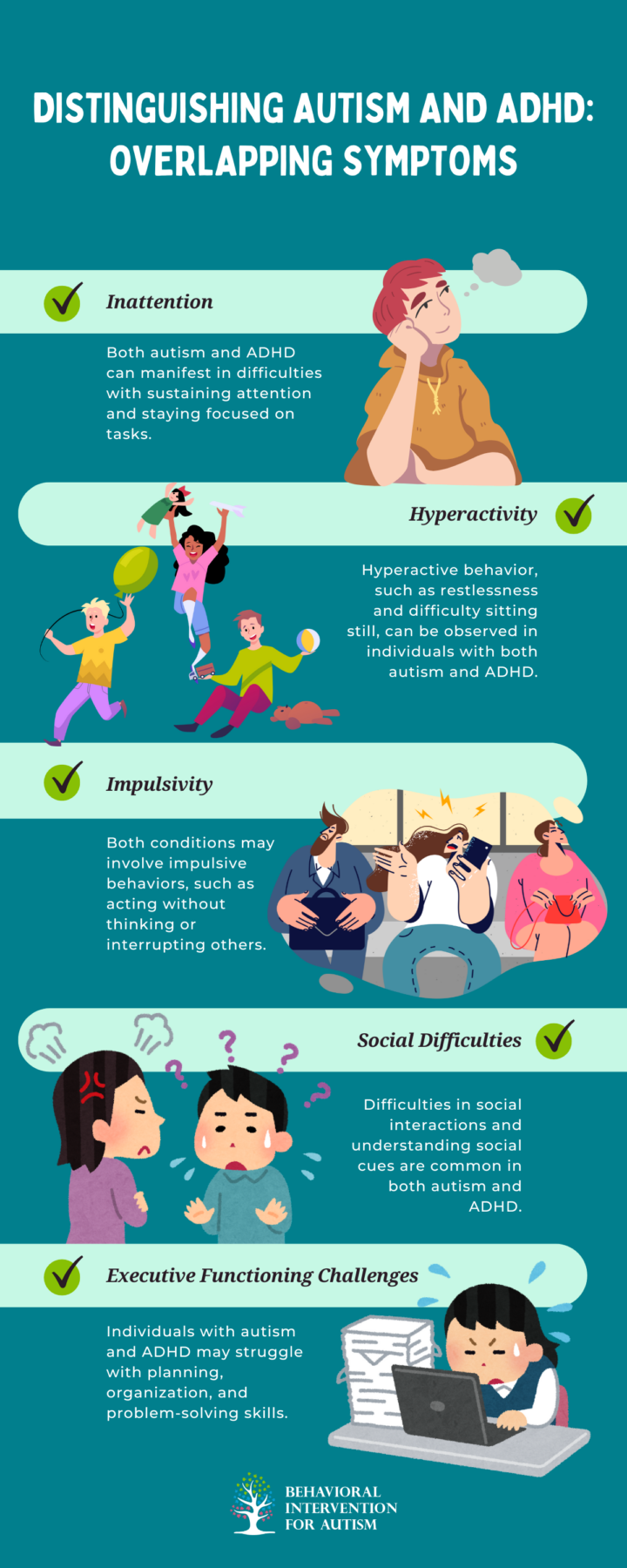
Table of Contents
Autism and ADHD often co-occur, a phenomenon known as autism and ADHD comorbidity, or AuDHD. This combination is more common than one might expect, with many individuals experiencing symptoms of both conditions. We’ll examine how often autism and ADHD occur together and investigate the shared symptoms between the two conditions.
Prevalence and Co-occurrence
Different studies suggest that anywhere between 50-70% of individuals with autism have ADHD as well. Similarly, about 20-50% of individuals with ADHD also have autism. These numbers highlight the significant overlap between the two conditions.
It is important to note that autism and ADHD are distinct disorders with their own diagnostic criteria. However, the presence of overlapping symptoms can make it challenging to differentiate between the two. The co-occurrence of autism and ADHD can create unique challenges in diagnosis and treatment planning.
Overlapping Symptoms
Autism and ADHD share several symptoms, which can make it difficult to distinguish between the two conditions. Some of the overlapping symptoms include:

The Diagnostic and Statistical Manual of Mental Disorders (DSM) stated that an individual could not be diagnosed with both autism and ADHD up until 2013. However, as of the most recent publication of the DSM-5, both conditions can be simultaneously diagnosed, recognizing the co-occurrence of autism and ADHD.
Understanding the prevalence and overlapping symptoms of autism and ADHD comorbidity is crucial for accurate diagnosis and effective intervention strategies. By recognizing the unique challenges presented by AuDHD, individuals, parents, and caregivers can seek appropriate support and tailor interventions to address the specific needs of those with both conditions.
Diagnostic Difficulties
One of the primary challenges in diagnosing the comorbidity of autism and ADHD lies in the significant overlap of symptoms between the two conditions. Both autism and ADHD can present with difficulties in attention, impulsivity, and hyperactivity. This overlap can make it difficult for professionals to differentiate between the two and accurately identify the presence of both conditions.
Typically, diagnoses for autism and ADHD are given separately, with professionals assessing and diagnosing each condition individually. This approach may lead to missed or delayed diagnoses of the comorbid presentation. As a result, individuals may not receive the appropriate support and interventions needed to address both autism and ADHD simultaneously.
Research has shown that a significant number of individuals with comorbid autism and ADHD have not been previously diagnosed with both conditions. Only 15.8% of children with autism and ADHD had received a prior dual diagnosis. In children, the co-occurrence of ADHD symptoms in autism ranges between 53% and 78%, while in community samples, it is lower at 28% to 31%. Conversely, a meta-analysis found a comorbidity rate of 21% for the co-occurrence of autism symptoms in young people with ADHD.
The diagnostic difficulties surrounding comorbid autism and ADHD underscore the importance of comprehensive assessments and evaluations. Professionals need to be aware of the potential coexistence of both conditions and consider evaluating for both when assessing individuals who display symptoms of either autism or ADHD.
Understanding the challenges in diagnosing comorbid autism and ADHD is crucial for improving identification, intervention, and support for individuals with this dual diagnosis. By addressing these challenges, professionals can provide more accurate and comprehensive diagnoses, leading to better outcomes for individuals who navigate the complexities of both conditions.
Medical Comorbidities and Long-Term Risks
Individuals with comorbid autism and ADHD may face additional challenges beyond the core symptoms of these conditions. Medical comorbidities, or the presence of other health conditions, are more prevalent in individuals with autism and ADHD comorbidity compared to those with either condition alone. These medical comorbidities can have long-term impacts on physical health and increase the risk of chronic diseases.
impact on physical health
The presence of autism and ADHD comorbidity can impact physical health in various ways. Medical comorbidities associated with these conditions can affect different body systems, leading to a range of health concerns. Some common medical comorbidities observed in individuals with autism and ADHD comorbidity include gastrointestinal issues, sleep disorders, and motor coordination difficulties.
Gastrointestinal issues, such as constipation or gastrointestinal reflux, are frequently reported in individuals with autism and ADHD comorbidity. These issues can cause discomfort and affect overall well-being. Sleep disorders, including difficulties with falling asleep or staying asleep, are also common in this population. Poor sleep can contribute to daytime fatigue, irritability, and difficulties with attention and behavior.
Motor coordination difficulties are another aspect of physical health that can be impacted. Difficulties with fine motor skills, such as writing or buttoning clothing, and gross motor skills, like coordination during sports activities, may be present. These challenges can impact overall physical functioning and participation in daily activities.
risk of chronic diseases
In addition to the immediate impact on physical health, individuals with autism and ADHD comorbidity are at an increased risk of developing chronic diseases later in life. Research has shown that medical comorbidities in individuals with autism and ADHD can contribute to the development of chronic conditions such as diabetes, heart disease, and cancer.
The exact mechanisms underlying the association between autism, ADHD, and chronic diseases are still being studied. However, it is believed that both genetic and environmental factors may play a role. The presence of medical comorbidities, along with potential lifestyle factors such as diet, physical activity, and access to healthcare, can contribute to the increased risk of chronic diseases.
It is important for individuals with autism and ADHD comorbidity, as well as their parents and caregivers, to be aware of these potential long-term risks. Regular medical check-ups, early intervention for any identified medical comorbidities, and healthy lifestyle choices can help mitigate the impact of these risks and promote overall well-being.
Understanding the medical comorbidities associated with autism and ADHD, along with their potential long-term implications, empowers individuals and their support networks to take proactive steps. By addressing these challenges, we can promote optimal physical health and enhance overall well-being.
Our team at Behavioral Intervention for Autism is dedicated to providing exceptional ABA programs in Florida, tailored to address the unique needs of those facing these complexities. We offer personalized, effective interventions that make a significant impact. To find out how we can support your journey, get in touch with us today.
- 9 Common Obsessions of Children With Autism You Should Know - February 25, 2025
- What is Neurodiversity? A Guide to Embracing Differences - February 25, 2025
- Understanding Hyperfocus in Autism: What It Means and Why It Happens - February 25, 2025
